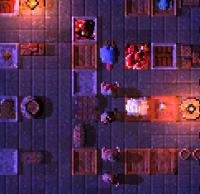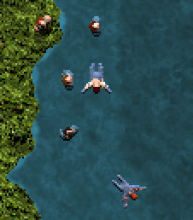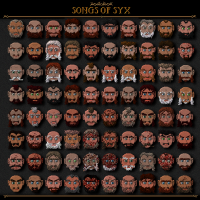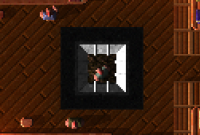Citizens: Difference between revisions
No edit summary |
Scribonius (talk | contribs) (Updated the section on religion, adding a link to the new page as well.) |
||
| Line 48: | Line 48: | ||
==Religion== | ==Religion== | ||
{{ | {{main|Religion}} | ||
Religion is yet another factor that contributes to the mental makeup and happiness of citizens. Each citizen will be inclined to believe in a certain god from the start, but this can be converted at any time. [[Temples]] can be built to appease citizens, giving them the opportunity to worship their favored gods. | Religion is yet another factor that contributes to the mental makeup and happiness of citizens. Each citizen will be inclined to believe in a certain [[gods|god]] from the start, but this can be converted at any time. [[Temples]] can be built to appease citizens, giving them the opportunity to worship their favored gods. | ||
There are 4 things that impact the religious happiness for your citizens: | |||
* '''Faith''' - The amount of citizens who have been able to worship at a temple of their god. Also effected by the quality of the temples they worship at. | |||
* '''Opposition''' - The tension caused by subjects of conflicting religions, makes citizens unhappy. | |||
* '''Burial''' - The current happiness of your citizens with the burial of their dead. Better burial grounds will make them happier. | |||
* '''Desecration''' - The amount of corses disturbed by the destruction of occupied burial grounds, makes citizens unhappy. | |||
==Happiness traits== | ==Happiness traits== | ||
Revision as of 19:25, 17 September 2022
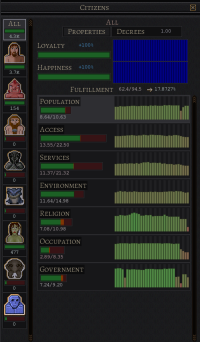
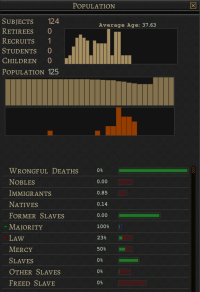
Citizens are the very lifeblood and backbone of a settlement. They come in seven unique races: the Cretonians, Dondorians, Cantors, Garthimis, Humans, Tilapis and Argonosh. With the guide of the player, they are responsible for performing all kinds of tasks and jobs to keep the settlement running and growing stronger, including the making of resources. All citizens have pre-generated names, personalities, faces, traits, wants, needs and preferred climate. These wants and needs must be met and managed by the player, to keep everyone happy and working at maximum efficiency. Unhappy citizens may leave your settlement.
Each race is unique in what they excel at, and what they like and dislike. When looking at each citizen individually, the details greatly increase. Each citizen has a pre-generated name, traits and personality. At any time, the player can click on a citizen to see their status. At any time, the player can check the amount of fulfillment and expectations of an individual, collectively as a race or all of the citizens in a settlement combined. Choosing a certain climate for your settlement will bring more immigrants of a race that matches a climate they prefer.
A settlement's population comes in five separate type of citizens: subjects, retirees, recruits, students, nobles, slaves and children. Children do not contribute anything while eating up the settlement's food, but can go to school and learn helpful skills, which will give them a massive advantage when they grow up and work. As the player's settlement expands and increases in quality, it will begin to see a rise in population through immigration. Note that population must be managed carefully, as if it's too low, there won't be enough people available to perform enough tasks and/or take employment, and if it's too high, the amount of food may not be enough to sustain everyone. Rising population will also increase standards and expectations of everyone.
Enemy citizens can attack the player's settlement at certain times. Citizens can be marked as a favorite, making them easier to track for the player. Certain races may also like or dislike other races, adding difficulty to a settlement made up of many races; most notably, all of them.
Mechanics
Working
By default, all citizens will wander around and do odd jobs, unless they are given employment in a building. There must almost always be unemployed citizens to be free to do tasks such as build buildings, cut down trees or collect stone from rocks in the ground. If they are employed, they will always be working the job the player assigned them.
Regardless of what a person's job is, they will always take time off to fulfill their needs, such as sleeping, eating, maintaining their hygiene, drinking, using the bathroom, relaxing (if they can) and being near hearths. As mentioned before, the wants and needs differ between races, and each individual person.
Odd jobbers will aimlessly wander around, waiting for player-made commands and will fulfill them as soon as possible. Employed individuals will constantly maintain their job, always collecting and using resources, and/or making them if the job entails this. If there are no resources for someone to properly do their job, they will just stand around with nothing to do.
Battle
At some point, when your settlement is developed enough, you will begin to face raids. To prepare for this, a training ground must be built, and the magnitude of training for the citizens should also be properly managed. If citizens are tough enough, they should be able to fight off raids, or at least weaken them. When training, citizens will begin as recruits, then upgrade to capable soldiers. Equipping these soldiers with battlegear will greatly increase their combat performance.
 Cretonians
Cretonians
- Main article: Cretonians
Cretonians are the most peaceful race, and excel at farming rather than more grueling work such as mining. They prefer warmer climates and areas with bodies of water. They are vegetarians and prefer wooden structures.
 Dondorians
Dondorians
- Main article: Dondorians
Dondorians are fundamentally the opposite of Cretonians, as they are adept at fighting and excel at refinery work and mining. They prefer colder climates and in terms of food, prefer meat and fish.
 Cantors
Cantors
- Main article: Cantors
Cantors are the rarest and one of the most unique of the races. Cantors are giants that are hard to recruit to your settlement and are hard to please. Cantors excel at almost all things in the game.
 Garthimis
Garthimis
- Main article: Garthimis
Garthimis are humanoid-insect hybrids, and can produce offspring the fastest of all the races. They do not care for the finer things in life, and do not take life nor death very seriously, making them excellent cannon fodder. Similar to Dondorians, they prefer meat and fish.
 Humans
Humans
- Main article: Humans
Humans are the most mentally flexible and free-willed of all the races. They also have the ability to withstand any type of climate. The foods they prefer are bread, fish, mushrooms and eggs.
 Tilapis
Tilapis
- Main article: Tilapis
Tilapis play the role of "dark elves" in the game. They are deeply passionate about the plant life and wildlife in the world, as well as passing judgement on others in a crime and justice sense, making them excellent at jobs related to those things. They are the second-rarest race in the game, right after the Cantors.
 Argonosh
Argonosh
- Main article: Argonosh
Argonosh are likely to be the oldest type of race in the game. They excel at being fast and doing serious damage in combat, but despise doing any real work. However, when it comes to crime or punishment related duties, they excel greatly there.
Religion
- Main article: Religion
Religion is yet another factor that contributes to the mental makeup and happiness of citizens. Each citizen will be inclined to believe in a certain god from the start, but this can be converted at any time. Temples can be built to appease citizens, giving them the opportunity to worship their favored gods.
There are 4 things that impact the religious happiness for your citizens:
- Faith - The amount of citizens who have been able to worship at a temple of their god. Also effected by the quality of the temples they worship at.
- Opposition - The tension caused by subjects of conflicting religions, makes citizens unhappy.
- Burial - The current happiness of your citizens with the burial of their dead. Better burial grounds will make them happier.
- Desecration - The amount of corses disturbed by the destruction of occupied burial grounds, makes citizens unhappy.
Happiness traits
- Loyalty - The overall loyalty of your citizens. The goal of any despot is to keep this high. Lower loyalty than 100% could lead to bloody riots. Happiness is a big factor, but other means exist...
- Happiness - Happiness is fulfillment is gained by providing services and a just rule. Expectation is the amount of citizens in your city. Happiness boosts submission and promotes immigration. This category has mini-categories included in how happiness is calculated.
- Fulfillment - A fulfillment modifier can be access to a tavern, or a road, or increased food rations. Each race has different weights tied to each modifier. Focus should be on the biggest modifiers first. Total fulfillment is an exponential function of the sum of all your fulfillment modifiers divided by the sum of all max fulfillments.
- Expectations - As your population grows, so will your subjects' expectations. Expectation is tied to a species occurrence in the climate you've chosen to settle and grows linearly.
- Prosecuted - Prosecution is the number of citizens that have been wrongfully arrested without committed a crime.
- Bonus' - Bonuses boosts certain areas of the game.
- Population - Statistics regarding population.
- Food - Stats related to food and hunger.
- Services - Services are provided by building service rooms and allow access to your subjects.
- Equipment - Having your subjects equip certain items can boost them in different ways. It can also improve happiness amongst them.
- Environment - External factors.
- Religion - Stats related to religion and afterlife.
- Work - Work related stats.
- Education - Stats regarded your education levels, and boosts surrounding it.
- Battle - Battle related stats.
Properties
Physics
 Weight - The weight of a subject.
Weight - The weight of a subject. Stamina - How far a subject can walk or run before needing to rest.
Stamina - How far a subject can walk or run before needing to rest. Speed - The speed of a subject, expressed in a tiles per second.
Speed - The speed of a subject, expressed in a tiles per second. Acceleration - How fast a subject speeds up.
Acceleration - How fast a subject speeds up. Healing - Determines how fast a subject heals its injuries and at what point of injuries it can recover from.
Healing - Determines how fast a subject heals its injuries and at what point of injuries it can recover from. Lifespan - The maximum amount of years a subject can live for.
Lifespan - The maximum amount of years a subject can live for. Heat Resistance - The ability for a subject to a endure hot temperatures.
Heat Resistance - The ability for a subject to a endure hot temperatures. Cold Resistance - The ability for a subject to endure cold temperatures.
Cold Resistance - The ability for a subject to endure cold temperatures.
Behavior
 Lawfulness - A lawful citizen is one that is reluctant to commit crime.
Lawfulness - A lawful citizen is one that is reluctant to commit crime. Skinnydipping - How often a subject skinnydips.
Skinnydipping - How often a subject skinnydips. Submission - Submission is useful for slaves. Submissive slaves will be reluctant to revolt and you can mistreat them more.
Submission - Submission is useful for slaves. Submissive slaves will be reluctant to revolt and you can mistreat them more. Happiness - Happiness is the overall happiness of your citizens. Unhappy citizens might riot.
Happiness - Happiness is the overall happiness of your citizens. Unhappy citizens might riot.
Battle
 Offense Skill - A soldier's offensive skill determines the ability to land a successful hit on an enemy and evade the enemy armour.
Offense Skill - A soldier's offensive skill determines the ability to land a successful hit on an enemy and evade the enemy armour. Defense Skill - A soldier's defensive skill is used when attacked frontally, to block or dodge an enemy's attack.
Defense Skill - A soldier's defensive skill is used when attacked frontally, to block or dodge an enemy's attack. Armor - Armour protects a subject from pierce damage, by reducing it upon a successful blow. It protects from all directions.
Armor - Armour protects a subject from pierce damage, by reducing it upon a successful blow. It protects from all directions. Pierce Damage - Damage dealt by a subject that cuts. A lot more devastating than blunt damage, but can be evaded by armour.
Pierce Damage - Damage dealt by a subject that cuts. A lot more devastating than blunt damage, but can be evaded by armour. Blunt Damage - Damage that disregards armour and is sheer force. Will be absorbed by the opponents weight, possibly causing injuries.
Blunt Damage - Damage that disregards armour and is sheer force. Will be absorbed by the opponents weight, possibly causing injuries. Accuracy - A soldier's capability to fling a projectile. This is multiplied with the stats of the ammunition in use.
Accuracy - A soldier's capability to fling a projectile. This is multiplied with the stats of the ammunition in use. Range Power - The power a subject is able to put into flinging a projectile. This is multiplied with the stats of the ammunition in use.
Range Power - The power a subject is able to put into flinging a projectile. This is multiplied with the stats of the ammunition in use. Morale - A soldier's morale is what determines how long, and against what odds and setbacks, it will fight for before taking flight.
Morale - A soldier's morale is what determines how long, and against what odds and setbacks, it will fight for before taking flight.
Rates
 Defecation - Defecation rate determines how often a subject needs to empty their bowl.
Defecation - Defecation rate determines how often a subject needs to empty their bowl. Soiling - The rate at which subject turn dirty and need to wash.
Soiling - The rate at which subject turn dirty and need to wash. Piety - The rate at which a subject want to visit a temple.
Piety - The rate at which a subject want to visit a temple. Hunger - At which rate subjects became hungry and need to eat.
Hunger - At which rate subjects became hungry and need to eat. Thirst - The rate at which a subject wants to consume drink.
Thirst - The rate at which a subject wants to consume drink. Sleep - The rate at which a subjects need to sleep.
Sleep - The rate at which a subjects need to sleep. Learning - The rate at which a subject is educated or indoctrinated.
Learning - The rate at which a subject is educated or indoctrinated.
Civics
 Maintenance - Decreases the rate at which our buildings degrade.
Maintenance - Decreases the rate at which our buildings degrade. Bartering - Improves the trust with your trade partners and allows you to sell your goods for a better price. This bonus is relatives to the base price of the particular resources.
Bartering - Improves the trust with your trade partners and allows you to sell your goods for a better price. This bonus is relatives to the base price of the particular resources. Spoilage - Decreases the spoilage rate of goods.
Spoilage - Decreases the spoilage rate of goods.
Rooms
The following relates to the production speed of working at these buildings.
 Catapults
Catapults Carry Capacity
Carry Capacity Woodcutters
Woodcutters Fisheries
Fisheries Claypits
Claypits Coal Mines
Coal Mines Gem Mines
Gem Mines Ore Mines
Ore Mines Sithilon Mines
Sithilon Mines Stone Mines
Stone Mines Hunters
Hunters Cotton Farms
Cotton Farms Fruit Farms
Fruit Farms Grain Farms
Grain Farms Mushroom Farms
Mushroom Farms Opiate Farms
Opiate Farms Vegetable Farms
Vegetable Farms Auroch Pastures
Auroch Pastures Entelodont Pastures
Entelodont Pastures Globdien Pastures
Globdien Pastures Onx Pastures
Onx Pastures Bakeries
Bakeries Breweries
Breweries Charcoalers
Charcoalers Metal Smelters
Metal Smelters Weavers
Weavers Bowyers
Bowyers Carpenters
Carpenters Fletchers
Fletchers Jewelers
Jewelers Masonries
Masonries Papermakers
Papermakers Potteries
Potteries Rationmakers
Rationmakers Smithies
Smithies Tailors
Tailors Training Grounds
Training Grounds Archery Ranges
Archery Ranges Libraries
Libraries Administrators
Administrators Cretonian Breeders
Cretonian Breeders Garthimi Hatcheries
Garthimi Hatcheries Human Nurseries
Human Nurseries Tilapi Nurseries
Tilapi Nurseries
Start
Administration
By building an administration building, admin points can be accumulated. Through the world screen, these points can be spent to make upgrades and/or heavy alterations to the settlement, many of which heavily affect the races of a settlement's population - many of these choices can boost or diminish both the population and citizens' loyalty, depending on what is chosen. Each choice is separated by race.
Population and loyalty
Four things can be chosen for each: elevation, prosecution, exile and massure.
- Elevation - Some special treatment for a species increases growth and happiness. Boosts loyalty.
- Prosecution - Prosecuting a species, severely diminishes growth and decreases happiness. Reduces loyalty and potentially increasing population.
- Exile - Forbid this species from immigrating and sends off any citizens to neighboring regions where they are still welcome. Reduces loyalty. Reduces both population and loyalty.
- Massacre - Commit genocide and instantly rid yourself of this species. Will cause an outrage, of course; make sure you have enough military presence to handle an eventual uprising. Greatly reduces both population and loyalty.
Programs
Admin points can also be spent on programs and improving conditions of many factors. Five things can be improved: infrastructure, sanitation, education, law and entertainment.
- Infrastructure - Increasing this improves living condition for all and thus increases maximum carrying capacity of the region. It also increase production.
- Sanitation - Increasing this lowers chances of epidemics and increases growth.
- Education - Increasing this contributes to your knowledge points and makes subjects more productive, while decreasing growth slightly.
- Law - Increasing this also increases loyalty significantly, but decreases production slightly.
- Entertainment - Increasing this improves happiness, but decreases industry output slightly.
Active traits
These traits are active abilities that are randomly given to citizens.
- Fighter - A natural-born fighter amongst ones kin.
- Glutton - Someone who likes to eat.
- Sleeper - Likes to sleep a little bit more.
- Sprinter - A bit faster than the rest.
Gallery
-
Working in a warehouse.
-
Citizens skinny dipping.
-
Many faces of the citizens.
-
A Cretonian trapped in an inescapable area.

